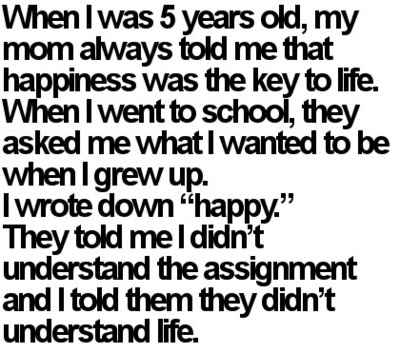Search (2518)
Happy Thoughts: Here are the things proven to make you happier:
hat's the secret to a head full of happy thoughts? Time to round up the research on living a happy life to see what we can use. First, yeah, a good chunk of happiness is controlled by your genes but there's a lot you can do to make yourself happier.…
5 minutes
This Personality Trait Leads To Long Lives, Happy Marriages And Money
ing conscientious. "Conscientiousness, which was the best predictor of longevity when measured in childhood, also turned out to be the best personality predictor of long life when measured in adulthood." "...our findings suggest that conscientiousness is the trait most broadly associated with marital satisfaction in this sample of long-wed couples." "Measured concurrently, emotionally stable and conscientious participants reported higher incomes and job satisfaction." "...the personality traits Conscientiousness and Neuroticism have a strong impact on the instantaneous probability of finding a…
1 min read
What do happy people have in common?
bsp; "Researchers... found that happy people are ten times more likely to be other-oriented than self-centered. This suggests that happiness is a by-product of helping others rather than the result of its pursuit." Via Shiny Objects: Why We Spend Money We Don't Have in Search of Happiness We Can't Buy: Most life goals can be placed in one of two opposing camps: personal happiness or service to others. In other words, goals are typically self-oriented or other-oriented. The problem is…
1 min read
Do open-plan offices make you more productive and happy?
. They're an utter nightmare. Via Quiet: The Power of Introverts in a World That Can't Stop Talking: Open-plan offices have been found to reduce productivity and impair memory. They’re associated with high staff turnover. They make people sick, hostile, unmotivated, and insecure. Open-plan workers are more likely to suffer from high blood pressure and elevated stress levels and to get the flu; they argue more with their colleagues; they worry about coworkers eavesdropping on their phone calls and spying…
1 min read
This question can predict whether you will be alive and happy at age 80
s there someone in your life whom you would feel comfortable phoning at four in the morning to tell your troubles to?" Via Flourish: A Visionary New Understanding of Happiness and Well-being: Is there someone in your life whom you would feel comfortable phoning at four in the morning to tell your troubles to? If your answer is yes, you will likely live longer than someone whose answer is no. For George Vaillant, the Harvard psychiatrist who discovered this fact,…
1 min read
Here’s How To Scientifically Train Your Mind To Be Happy
aining your mind to look for errors and problems (as happens in careers like accounting and law) can lead you toward a pervasive pessimism that carries over into your personal life. Via One Day University Presents: Positive Psychology: The Science of Happiness (Harvard's Most Popular Course): We discovered if you play Tetris for too long you start parsing the world into “How do I make straight lines.” It’s great if you’re playing Tetris, but maladaptive if you’re not. This is…
2 minutes
Why can it be so hard to be happy?
ere are a number of errors we consistently make when predicting what will make us happy. (I've embedded links below to explain them further.) Via Happiness: Unlocking the Mysteries of Psychological Wealth: There are several predictable thinking errors people commonly make that lead them to incorrectly predict their own future emotions in general, and future happiness in particular: Focusing on a single salient feature or period of time in a choice, rather than looking at the big picture. Overestimating the…
1 min read
The Two Techniques You Can Learn From Naturally Happy People
turally happy people unconsciously engage in: Social comparison (or the lack thereof) Retrospective judgment Via Happiness: Unlocking the Mysteries of Psychological Wealth: Sonja Lyubomirsky identified ways in which dispositionally happy people think in ways that bolster their moods: social comparison and retrospective judgment. Even if you're not a naturally happy person you can use these techniques to increase positive feelings. So what the heck do those fancy words mean and how can we leverage them? 1) "Social comparison" means don't…
2 minutes





